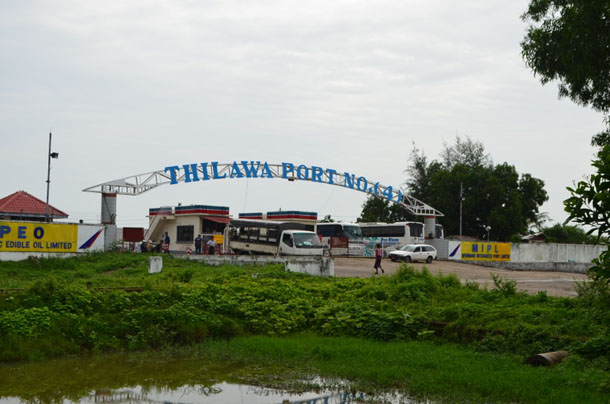Will Japan Become a Model of Irresponsible Development in Burma?
By Burma Partnership • May 6, 2014 As the Thilawa Special Economic Zone Project (Thilawa SEZ) forges ahead, anger over the treatment of the local communities who are being displaced is growing. The Japan International Cooperation Agency (JICA), who just signed a deal that formalizes the financing of Thilawa SEZ is treating the communities currently living on the site area with undisguised disdain, drawing ire from local and international organizations, including on their home turf.
As the Thilawa Special Economic Zone Project (Thilawa SEZ) forges ahead, anger over the treatment of the local communities who are being displaced is growing. The Japan International Cooperation Agency (JICA), who just signed a deal that formalizes the financing of Thilawa SEZ is treating the communities currently living on the site area with undisguised disdain, drawing ire from local and international organizations, including on their home turf.
Covering around 2,400 hectares of land, the Thilawa SEZ is located 20km outside Rangoon and will include factories, a deep sea port, housing developments and other infrastructure for transport and communications. The project is a joint effort between Japan and Burma, with the Burma government and domestic businesses holding a 51% stake and the Japan government and Japanese businesses owning a 49% stake with funding being channelled through JICA as part of Japan’s overseas development assistance. Yet in order for these components to go ahead thousands of local people will be displaced. Phase One of the project, which has already started, has seen the relocation of 300 villagers yet the relocation site consists of inadequate housing, no alternative farmland, a lack of a clean water supply and very few livelihood opportunities, leaving people in debt just a few months after moving.
Neither the Burma government, nor JICA are listening to the concerns of these villagers. Despite repeated requests for meetings with JICA, and letters sent to outline their concerns over new living conditions, JICA has absolved itself of responsibility, claiming it is the Burma government’s job. Yet this is the same government whom, in August 2013, forced villagers to sign relocation agreements with the threat of destroying their homes, while said villagers were not provided a copy of this agreement.
As the Japanese NGO, Mekong Watch, pointed out in a statement issued last week, this violates JICA’s own social and environmental safeguards, “JICA incorporates stakeholder opinions into decision-making processes regarding environmental and social considerations by ensuring the meaningful participation of stakeholders in order to have consideration for environmental and social factors and to reach a consensus accordingly. JICA replies to stakeholders’ questions.” If JICA’s constant refusal to meet or reply to the letters of affected communities does this mean that the people currently living on this site are not a stakeholder? Meanwhile, JICA’s safeguards on resettlement are also being breached. A Resettlement Work Plan does not give a fair price for lost crops and livestock or take the human rights context into consideration.
This is not the only mega project that JICA is involved with in Burma. In October 2013, JICA published a study it conducted in eastern Burma of a framework for development, including industrial estates and free trade zones, urban development of towns, and resettlement sites and economic opportunity for returning refugees and internally-displaced persons (IDPs). What the study assumes is that peace in this area, which has been suffering from the negative effects of armed conflict for decades, will be achieved through development. The worrying part of this framework is that eastern Burma is still a very fragile place, with ceasefires only initial and long-standing issues yet to be addressed. As such, it is an extremely sensitive situation. If JICA plans to bulldoze ahead with projects such as industrial estates and infrastructure, all the while ignoring concerns of local stakeholders just as it has done with Thilawa SEZ, the consequences are potentially hugely destructive and the outbreak of active conflict a very real possibility.
JICA’s own guidelines state that relocated people are provided with at least the same livelihood opportunities as before and that they must consult widely with stakeholders. As seen with its framework for the development of eastern Burma, Japan has huge plans, but if Thilawa SEZ is the starting point, it sets a terrible precedent for future projects.
JICA must abide by its own environmental and social safeguards, they are written for a reason. This includes not only consulting with the affected communities, but taking their concerns into account and addressing them. Furthermore, it must provide adequate livelihood opportunities and compensation for those relocated, and with the spiraling debt of those already relocated, this is an urgent matter. Without genuine and transparent dialogue with local communities, Japan’s reputation in Burma will be sullied permanently and Thilawa SEZ, rather than being a showcase of sustainable development and prosperity, will be a symbol of disregard for the rights of local people.
Tags: Environment, Government of Myanmar, Internally Displaced People, Japan, Japan International Cooperation Agency, Livelihood, Thilawa Special Economic ZoneThis post is in: Blog
Related Posts၈၈ မ်ဳိးဆက္ ၿငိမ္းခ်မ္းေရးႏွင့္ ပြင့္လင္းလူ႔အဖြဲ႔အစည္း (လယ္ယာစီးပြားႏွင့္ ေတာင္သူလယ္သမား ေရးရာဌာန) အမ်ဳိးသားေျမ အသုံးခ်မႈ မူ၀ါဒ (မူၾကမ္း)ႏွင့္ ပတ္သက္၍ သေဘာထား ထုတ္ျပန္ခ်က္
Afraid to Go Home: Recent Violent Conflict and Human Rights Abuses in Karen State
New Report Documents Recent Violent Conflict in Karen State
New National Land Use Policy Must Reflect the Concerns of those Affected
Karen Civil Society Rallies Around Japan’s Harmful Plans for Eastern Burma









 All posts
All posts